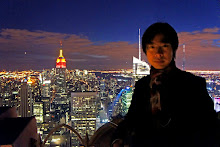I don't really know how to start describing all these.
Since ASSC in 2008, I have been very impressed by empirically-informed philosophy.
However, given many reasons and excuses, many of them cultural, I stayed in my comfort zone. I did very traditional philosophy of mind and epistemology. There is nothing wrong with them. I had fun, and I still like them. Still, I feel that something is missing; something I do not know how to even begin to learn.
When I moved to CUNY in 2010, I have been entirely converted. One single most important thing the western world taught me is that it is never too late - people around me are keen to learn new things, including those are already in their seventies. Why can't I learn new knowledge in unfamiliar areas, even if I was already 30 or so?
The question is how. I had been surveying many ways to learn psychology and neuroscience. I audited classes, studied text books, read papers, attended talks, spent time with scientists. I did learn much from all these, but nothing systematic; nothing good enough to help my research. I felt that I have been doing this for several years but it did not work
During a trip to Berkeley in 2011, I had much time to rethink my approach. At that time I was pretty sure that I will move to London after 2012, so I checked resources in London. I discovered that at Birkbeck there are flexible courses for those who do not have background. Other schools have similar resources too, though many of them are MSc that might be too challenging for me. Basically, I will not get in most of them. But since then I have borne this information in mind.
And I moved to London. Now it has been one year. Lots of things happened during this year, and I have been considering how to start this adventure. Last week, I finally figured out what I should do and all the details. I am starting a certificate course at Birkbeck from this term. It consists of 6 courses that roughly cover the first 1.5 years in undergrad. This is exactly what I need. At the same time, I will seek to apply for MSc for next year's entry. It might not work, but in that case I will simply complete the certificate course. It sounds humble or even boring, but nothing better I can do. I will start from scratch.
The story has been cut down very short, but it should be enough for those who care about my progress. So far I have only got the student ID and nothing has started. But from next week the new adventure will begin. No matter whether this is silly, I am definitely doing it.
2013年9月22日 星期日
So Long, Fred
To my
memory I met Fred Dretske twice. The first time was at Rutgers Epistemology
Conference 2011. During one long coffee break (30 mins or so), he was left
alone in the middle of the crowds by random. I was not going to talk to him,
since although my thesis back then was related to his hyper OVERFLOW view about
the content of consciousness (i.e., an extreme version of Ned Block's relevant
view), at that moment I was not ready to ask questions about it. But in any
case he had been left alone for a while (which is not normal given who he is),
so I made a move and brought up the issues I'd like to talk about. He was keen
to discuss it and found a table for us, which was unexpected - I thought he
might have simply said something quickly and tried to leave. As a result we
discussed relevant issues for at least 20 minutes. The overall message is that
he was provoked by Daniel Dennett's extreme sparse view and attempted to count
against it, and my position was that Fred's view is an overreaction and is not
well supported by his arguments. I still hold this verdict today.
The
second time we came across was at Pacific APA 2012, where he presented his
critic of Susanna Siegel's book on the content of visual experience. My view
was different from both, but I learned something important from Fred's
comments. I was surprised by the fact that he not only showed up at conferences
given his age, but also presented something for us. During that conference I
did not have a chance to further talk to him, but both of us attended a session
where Josh Weisberg and Adrienne Prettyman were presenters and Richard Brown
was a commentator. Fred asked helpful questions during the session. He saw me
in the audience and waved to me. I believe he might not recall my name but it
does not matter. That was a nice farewell.
Given
that Fred was still active last year, I presume his last days were not too
painful. I might be wrong, but that is my wishful thinking.
Like
many philosophers in my generation, I have not had a chance to study his
classic works carefully. But I will. My thesis at CUNY has the title
"Consciousness and the Flow of Attention," which was unabashedly
inspired by Fred's seminal work. I am glad that as a philosopher in this
generation I overlapped with this great philosopher.
So
long, Fred. We will miss you.
訂閱:
意見 (Atom)


